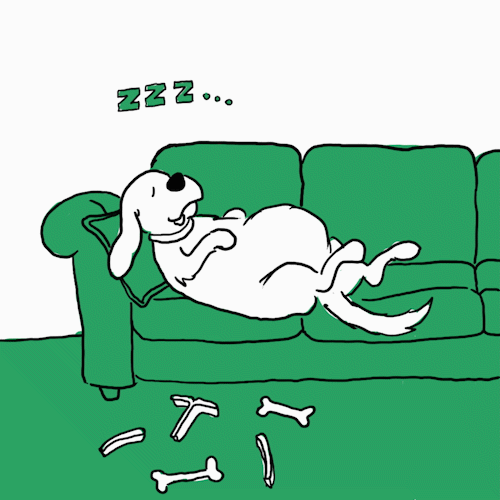

Have you ever spotted your beloved canine companion nibbling on the lush green blades in the backyard and found yourself pondering the reason behind this seemingly peculiar behaviour? This intriguing habit has fascinated pet owners and experts for generations. In this blog, we will explore the various factors that might drive your furry friend to indulge in this grassy feast, unfolding the mystery behind their seemingly strange dietary preferences and habits.
Dogs have been known to display a liking towards occasionally nibbling on grass. While the exact rationale may differ from one dog to another, several theories attempt to shed light on this behaviour, providing explanations for this habit. Understanding the underlying motivations can provide valuable insights into our furry friends’ dietary preferences. Your dog could be eating grass due to various causes, some of which are listed below.
Some dogs simply relish the taste and texture of grass, which might be due to the change in taste, texture, or smell during different seasons. For them, indulging in a bit of greenery might be akin to us savouring a favourite snack. It may not necessarily serve any particular purpose other than fulfilling a canine craving for something different and intriguing, making it a harmless pastime that satisfies their curious taste buds and offers them a brief moment of sensory delight amid their daily routines.
In certain instances, dogs may resort to grass as a means of alleviating boredom and seeking sensory stimulation. Particularly for those lacking sufficient mental or physical engagement, exploring the various textures and tastes of the outdoors can serve as a form of entertainment, helping to pass the time and provide a temporary distraction from their otherwise monotonous routines. This act of grazing on grass could serve as a form of mental enrichment, offering them a much-needed change of pace and an opportunity to engage their senses.
Dogs, like humans, require a certain amount of fibre in their diets to maintain a healthy digestive system. Since grass is a natural source of fibre, sometimes dogs can eat grass instinctively to aid in digestion, especially if their regular diet lacks adequate fibre content. This act of consuming grass could potentially help them regulate their digestive processes, promoting better overall gut health and ensuring smooth bowel movements, contributing to their overall well-being and physical comfort.
Surprisingly, grass contains certain properties that could aid dogs in purging their system of any potentially harmful intestinal parasites. By inducing vomiting through grass consumption, dogs might instinctively attempt to cleanse their digestive tract, ridding themselves of any unwelcome parasites that could be causing discomfort or distress. This natural mechanism could be a part of their innate self-care routine, serving as a means of maintaining their overall health and well-being while safeguarding them from potential health risks posed by internal parasites.
Keeping a close eye on your dog's grass-eating habits is essential for understanding their overall well-being. Despite common assumptions, the act of consuming grass does not necessarily indicate an underlying illness, with reports suggesting that only about 10% of dogs appear to be unwell before indulging in grass. This emphasises the importance of paying attention to other cues to gauge your pet's health accurately and understand if grass is good for dogs.
Furthermore, it is worth noting that most dogs, approximately 25%, who consume grass do not end up vomiting regularly after grazing. This challenges the conventional notion that grass consumption leads to subsequent vomiting. Some experts propose that this behaviour might aid in digestion or cater to specific nutritional requirements, such as the need for additional dietary fibre, indicating a potentially intuitive dietary mechanism in canines.
However, as mentioned previously, it is plausible that your dog simply relishes the taste or texture of grass, viewing it as a form of sensory stimulation. By closely observing your dog's grass-eating patterns and any accompanying behaviours, you can discern whether this habit is a matter of preference or indicative of underlying health issues that require attention. This vigilance allows for a comprehensive understanding of your pet's dietary preferences and potential nutritional needs.
If you suspect your dog is eating grass out of boredom, it is crucial to ensure it is getting sufficient exercise and mental stimulation. Consider incorporating engaging activities into its routine, such as playing interactive games like fetch or providing it with durable chew toys to keep it occupied and mentally stimulated.
In cases where your dog's grass-eating behaviour stems from a potential nutritional deficiency, transitioning to a higher-quality dog food, particularly one rich in dietary fibre, could help address the underlying issue. Consulting with a veterinarian to determine the most suitable dietary adjustments for your dog is advisable to ensure it receives the necessary nutrients.
While most experts agree that grass consumption itself isn't harmful, it's important to remain mindful of potential hazards. Some lawn treatments, including herbicides and pesticides, can be toxic if ingested. Similarly, several common household and garden plants are toxic to dogs, leading to health complications if consumed alongside grass. Being vigilant about the types of plants and substances your dog has access to will significantly mitigate potential risks associated with their grass-eating behaviour.
Yes, it can be normal. Some dogs eat grass occasionally as a natural behaviour, but excessive consumption might indicate a need for dietary or behavioural adjustments.
Not necessarily. If it's occasional and doesn't cause harm, it might be fine. However, if it's excessive or leads to vomiting or other issues, consult a vet.
Monitor for any unusual behaviour or digestive issues. If it continues or causes problems, consult a vet to rule out underlying health issues.
Provide a well-balanced diet and ensure enough physical and mental stimulation. Redirect their focus with toys or activities and consult a vet if the behaviour persists.
Dogs may eat grass due to various reasons, such as dietary deficiencies, upset stomachs, natural behaviour, or simply because they enjoy the taste or texture. If it becomes frequent, consulting a vet can help identify any underlying issues.


We may often envy our dogs for the kind of life they lead. Chilled, relaxed, and always well-rested. After sleeping like babies all night, dogs have the ability to nap throughout the day. You will find them basking under the sun, dozing off on the couch, or just napping next to your feet. When they do wake up after they’ve had their fat naps, they are full of energy and ready for some serious playtime.
Many animals, like dogs, sleep differently than we humans do. This is a very common reason for dog parents to wonder why my dog is always sleeping. Is my dog sleeping a lot or not enough? If you are wondering how much sleep do dogs need, there is more than one answer to this question. Just like how our sleep cycles change throughout our lives depending on our age, health, lifestyle, etc, a dog’s sleep cycle also changes depending on its age, health, and lifestyle. Keep reading to learn more about how long do dogs sleep, so it’s easier for you to understand your floof’s sleep patterns.
Dogs need a considerable amount of sleep; a lot more than we do. Additionally, carnivores like dogs sleep a lot more than herbivores since sleep is more dangerous for prey animals. The total number of hours a dog needs to sleep for varies on different factors such as its age, its health condition, and the kind of life it leads. Out of all these factors, age matters the most.
Dogs can sleep for around 12-14 hours each day, but puppies can clock in even more hours. This is because the body needs a lot of rest and repair during the first few months of life. Let’s take a look at how age affects the sleep cycle of dogs.
Puppies need to sleep for as long as their body needs to facilitate growth and repair. It is completely normal if your puppy sleeps for most of the day. In fact, puppies tend to sleep more throughout the day and less through the night.
Most adult dogs tend to sleep for anywhere between 8 to 13 hours, averaging around 11 hours each day. Yes, that’s a lot but that’s also a charm for these cute, cuddly floofs. Adult dogs tend to sleep for longer during the night depending on their and their pet parent’s schedule. However, napping for them is equally important. That being said, sleeping for a few hours during the day is absolutely normal.
Senior dogs and middle-aged dogs sleep as much as puppies. They tend to not wake up through the night and nap for a considerable number of hours throughout the day. These hours of sleep make sure that their body is well rested and recovering well as their body continues to age.
We now know that dogs, on average, can sleep for 15 hours a day irrespective of their age. However, every dog is different and will stick to a different routine which is okay. As a pet parent, you will soon understand your floof’s sleeping cycle and how its body functions.
If you do start worrying about your floof sleeping for too long, do not hesitate to contact your vet. It is always better to clear your doubts and take your furry friend to the doctor for a check-up and be sure. Another cause for concern that should be kept in mind is your dog sleeping for longer than usual. This could be a sign of underlying causes such as diabetes, dog depression, anxiety, and more. This is why a visit to the vet whenever you are worried is highly recommended.
There could be many reasons as to why your dog is sleeping so much. Our first thought is always an underlying disease that should be checked out by the vet. While this is highly recommended and also very common, many other reasons can make your dog sleep for very long.
If you’re wondering “Why is my dog always sleeping?”, the answer could be as simple as boredom. Sometimes dogs will resort to sleeping simply because they do not have anything to do. Apart from boredom, stress and anxiety are also major reasons for dogs sleeping too much. If your dog is anxious, you will notice it being lethargic and falling asleep often. The best way to combat this is to establish a routine and include some wholesome playtime.
Your dog can be susceptible to hyperglycaemia if its body is unable to produce the minimum amount of insulin needed. Certain dog breeds are at a higher risk of this disease as compared to other breeds. Visit your vet to diagnose conditions like this early and do the needful.
Viral infections in dogs are highly contagious and can affect your floof’s body greatly. Because of viral infections, your floof’s body will be unable to absorb any nutrients and will leave it dehydrated. Other than that, your floof will also suffer from a lack of protein and recovering from this disease will take some time. Resort to early puppy vaccination to keep occurrences as such at bay.
This infection caused by bacteria is highly contagious and your dog can get this disease easily through direct contact with urine from other dogs. This disease can also be passed on by humans. Again, this disease can drain your floof’s body of energy resulting in it falling asleep way too often.
Poisoning is a reason that should not be neglected by dog owners. If your dog is not trained and will eat anything palatable, it is at risk of poisoning itself. Other than that, many human foods are also poisonous to dogs. Avocados, spices, coffee, cheese, and more are foods that should not be fed to dogs, especially when you're pampering your floof.
Now that you know how much sleep do dogs need on average, you can notice any sudden changes in your dog’s sleep patterns. See a vet immediately if you suspect any illness or disease.

